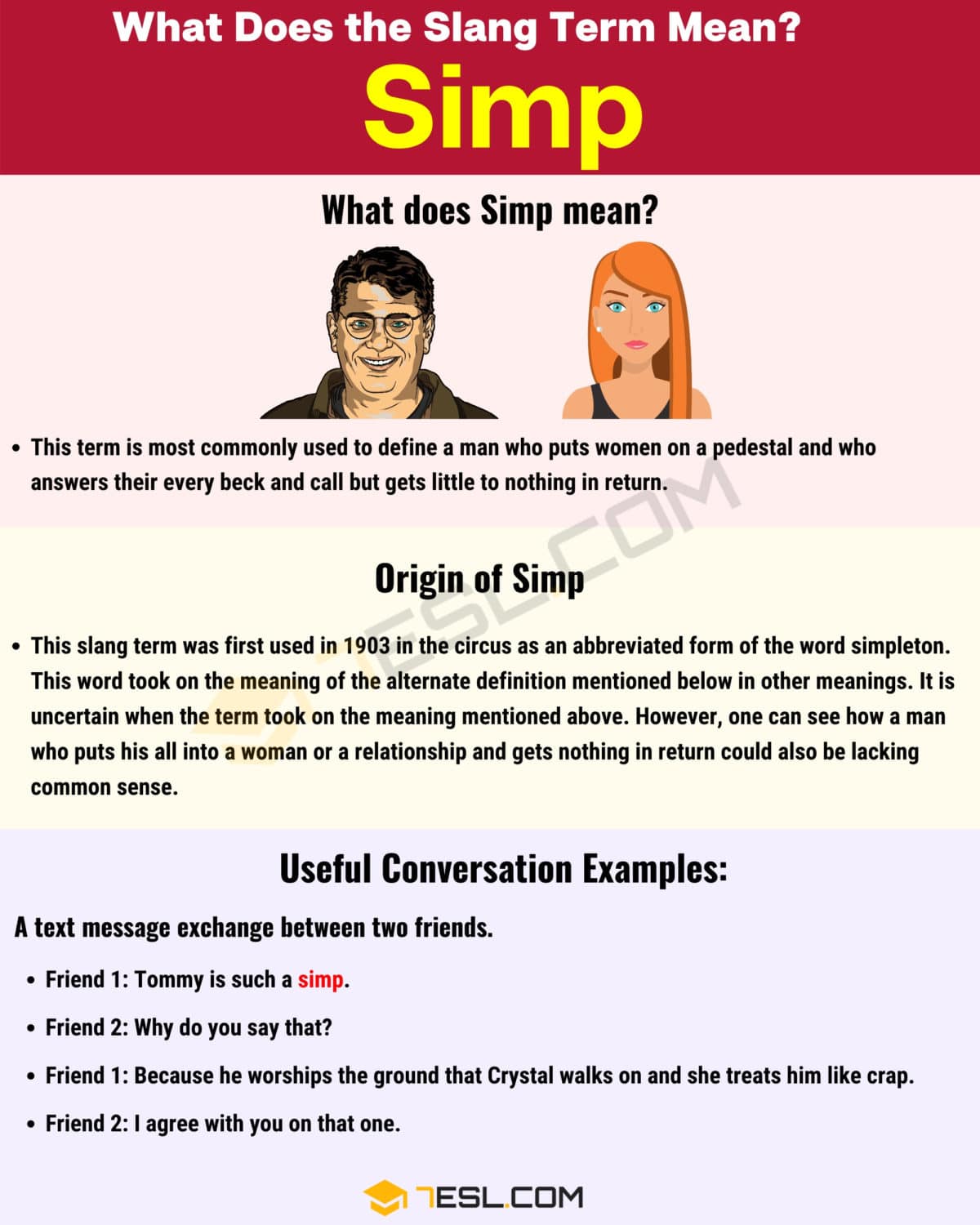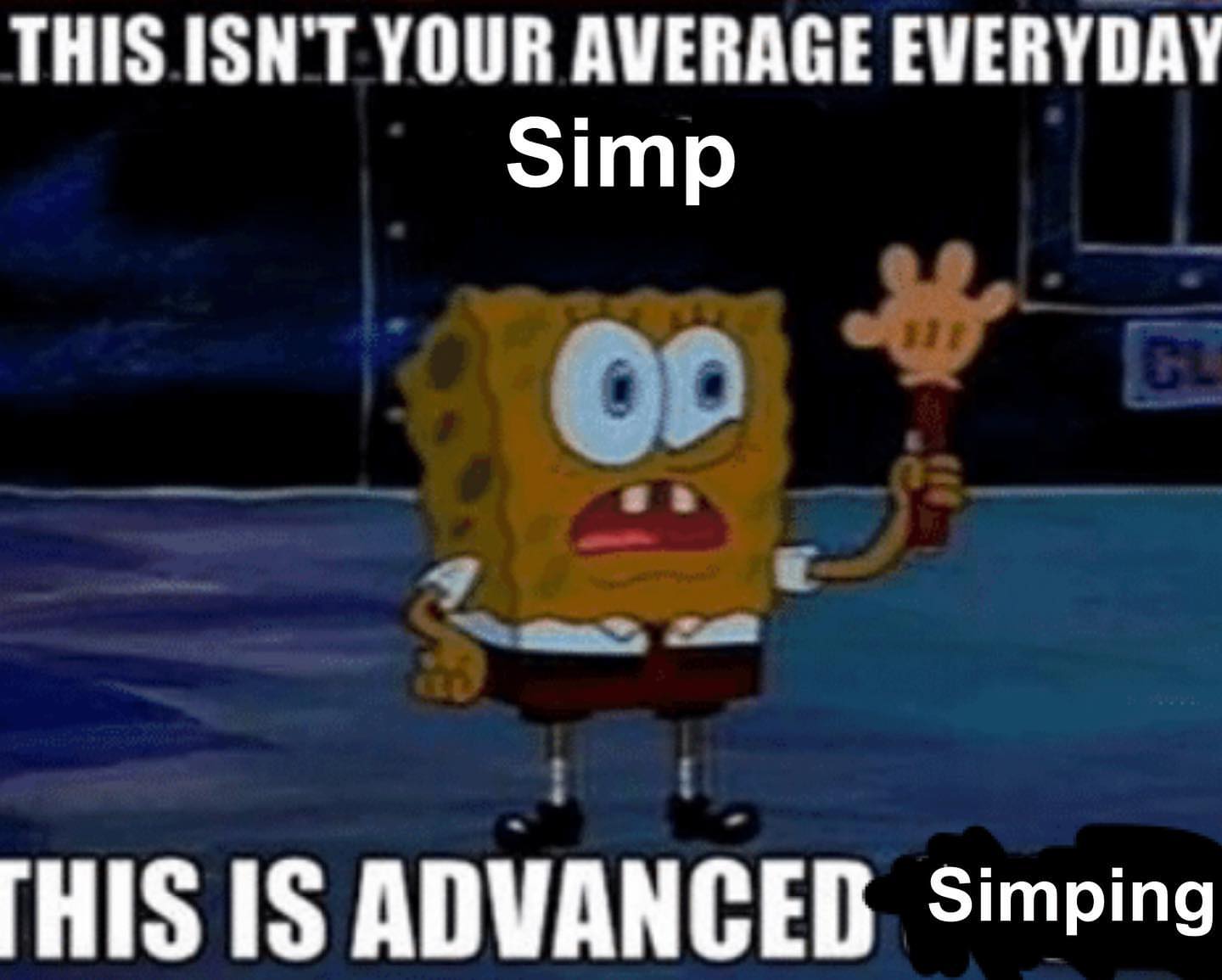The term "simp" has gained immense popularity in recent years, often sparking debates about its meaning, origins, and implications. Whether you're curious about its literal definition or its cultural significance, this article dives deep into the topic to provide clarity and context. From its roots in internet slang to its current usage, we’ll explore how "simp stands for" has evolved into a term that resonates with millions.
Understanding what "simp stands for" isn’t just about decoding slang—it’s about recognizing how language evolves in the digital age. The word "simp" has been used in various contexts, ranging from playful teasing to serious discussions about relationships and societal norms. As we delve into the details, you’ll discover how this term has transcended its original meaning to become a part of everyday conversations. We’ll also examine why it’s important to approach such terms with nuance and sensitivity, especially when discussing human behavior.
So, what can you expect from this article? We’ll break down the meaning of "simp stands for," explore its origins, and analyze its impact on social dynamics. Along the way, we’ll answer common questions like, "Is being called a simp a compliment or an insult?" and "How has the term influenced online culture?" By the end of this piece, you’ll have a comprehensive understanding of why "simp stands for" has captured the attention of so many and how it fits into the broader landscape of internet slang.
Read also:Honeytoon Comics A Comprehensive Guide To The World Of Creativity And Entertainment
- What Does Simp Stand For?
- Is Being Called a Simp a Compliment or an Insult?
- The Origins of Simp Stands For
- How Has Simp Stands For Impacted Online Culture?
- The Psychology Behind Simp Stands For
- Famous Examples of Simp Stands For in Pop Culture
- Can Simp Stands For Be Positive?
- The Impact of Simp Stands For on Relationships
- How to Use Simp Stands For Responsibly
- Conclusion: Why Simp Stands For Matters
What Does Simp Stand For?
The term "simp" is an abbreviation for "simpleton" or "sucker in meaningful pain." While the exact definition can vary depending on the context, it generally refers to someone who goes out of their way to please or impress someone they are romantically interested in, often at the expense of their own dignity. In internet slang, "simp stands for" someone who is perceived as overly submissive or devoted to another person, particularly in romantic or flirtatious scenarios.
Over time, the term has taken on a broader meaning, encompassing behaviors that prioritize others' needs over one's own in a way that seems excessive or unwarranted. For example, a person might be labeled a "simp" if they shower someone with gifts, attention, or affection without receiving much in return. While some view this as a harmless or even endearing trait, others see it as a sign of imbalance in relationships.
Is Being Called a Simp a Compliment or an Insult?
One of the most common questions surrounding "simp stands for" is whether being called a simp is a compliment or an insult. The answer depends largely on the context in which the term is used. In some cases, it can be a lighthearted way of teasing someone for being overly attentive or affectionate. In other cases, it can carry a negative connotation, implying that the person is naive or overly eager to please.
- Complimentary Use: When used positively, "simp" might highlight someone's kindness, generosity, or willingness to prioritize others' happiness.
- Insulting Use: When used negatively, it can suggest that someone lacks self-respect or is being taken advantage of in a relationship.
The Origins of Simp Stands For
The origins of "simp stands for" can be traced back to early internet forums and meme culture. It first gained traction as a slang term in the 2010s, particularly on platforms like Reddit and Twitter. Over time, it became a staple of online discourse, often used humorously to describe exaggerated displays of devotion or admiration.
How Has Simp Stands For Impacted Online Culture?
The rise of "simp stands for" has had a significant impact on online culture, shaping the way people discuss relationships and social dynamics. Memes, TikTok videos, and viral posts have all contributed to the term's popularity, making it a go-to phrase for describing certain behaviors. However, its widespread use has also sparked debates about whether it promotes harmful stereotypes or fosters negativity in discussions about relationships.
The Psychology Behind Simp Stands For
What drives someone to act in a way that aligns with the "simp stands for" stereotype? Psychology offers some insights into why people might prioritize others' needs over their own. For example, individuals who are highly empathetic or have a strong desire for validation may be more likely to exhibit "simp-like" behaviors. Understanding these underlying motivations can help us approach the term with greater empathy and understanding.
Read also:Laila Jenner A Rising Star In The Spotlight
Famous Examples of Simp Stands For in Pop Culture
Pop culture is rife with examples of characters or celebrities who embody the "simp stands for" archetype. From overly devoted partners in romantic comedies to real-life figures who have been labeled "simps" by the media, these examples highlight how the term has permeated our collective consciousness.
Can Simp Stands For Be Positive?
While "simp stands for" is often used negatively, there are scenarios where it can carry a positive connotation. For instance, someone who prioritizes their partner's happiness or goes out of their way to show affection might be viewed as caring and considerate. In these cases, the term can serve as a reminder of the importance of kindness and selflessness in relationships.
The Impact of Simp Stands For on Relationships
The concept of "simp stands for" has influenced how people perceive and navigate relationships. While some argue that it encourages healthier boundaries, others believe it perpetuates harmful stereotypes. By examining its impact, we can better understand how language shapes our views on love, respect, and mutual understanding.
How to Use Simp Stands For Responsibly
Using "simp stands for" responsibly involves being mindful of its potential implications. Labeling someone a "simp" can sometimes reinforce negative stereotypes or discourage genuine acts of kindness. To avoid this, it’s important to consider the context and intent behind the term.
Conclusion: Why Simp Stands For Matters
In conclusion, understanding what "simp stands for" goes beyond decoding slang—it’s about recognizing how language reflects societal attitudes and behaviors. Whether used humorously or critically, the term has become a lens through which we examine relationships, self-worth, and social dynamics. By approaching it with nuance and empathy, we can foster more meaningful conversations about the complexities of human interaction.

